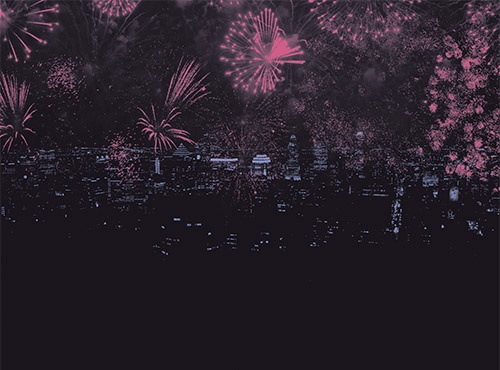
Past Curfew
Letter from Montreal
The way people make mistakes—unconscious missteps of the tongue, Freudian slips and misattributions—is a fascinating trap door into the way they really feel. So it was revealing to me this summer, when, conjuring up a memory from May 28, 2021—the night that Montreal’s months-long curfew was finally lifted—I referred to it as New Year’s Eve.
Of course, there were similarities: the fireworks spider-webbing the sky, the drinks with friends, the atmosphere, which, if not quite “anything goes” was at least “a few more things go.” And, of course, the big communal countdown.
There was also the fact that for a week or so afterwards it was common to swap stories with friends about what you’d done that fateful night: who you’d been with and how late, finally, you’d crawled into bed. The fact that the countdown—what to call such an occasion? Curfew Year’s Eve? Le Couv-el An?—occurred at 9:30 PM in late May and not at the tail end of December was little more than an asterisk.
In the days leading up to curfew lifting, my partner Blair and I had juggled our desires (stay out late, see friends) and boundaries (avoid crowds, keep outdoors) before settling on a plan that felt right: we’d climb Mount Royal with our friends Molly and Dane. When Molly met us at the base of the monument around 9 PM, her joke about wanting to perform open-air burlesque felt apt. We were shedding layers of something—inhibition, fear, the hoary closed-offness that had defined the winter for so many Montrealers, the enforced emptiness of our nights, the numbing sameness of our days.
The clearest sign that something was in the air was an unexpected addition to our party. A woman about our age sat down near Molly and started chatting with her, and before long, Hallie was a bona fide member of our climbing expedition. When Dane arrived, he greeted her no differently than he might have an old friend, and as Hallie joined in our reminiscences about bygone cheaper rents, I realized I’d forgotten that you could still talk to strangers, still find common ground through happenstance.
Before we’d gone far, we came upon a scene that felt stripped from a dream—a golden glow, a thumping beat, a few dozen ravers going wild, packed tight in a way that felt distinctly unsafe, a glowing ember of carefree revelry in the Mountain’s enveloping dark. We were drawn to it despite ourselves. We hadn’t seen dancing in so long. I breathed a sigh of relief when we returned to the path and kept moving, unnerved by the secret forest ball’s magnetic pull.
When we reached the stairs toward the Kondiaronk Belvedere, I tore up the steps, taking them two at a time. It was a thoughtless move and a few minutes passed before Blair joined me. Hallie, she said, hadn’t been able to manage the stairs—earlier, she’d mentioned a disability, but had gamely tried to stick with her newfound friends. After a brief discussion, Dane had ended up offering to walk her back down to the street.
Eventually, Molly came into view, and she, Blair and I made our way to the belvedere. Indoors every night, I’d missed the fullness of the pitch-black sky. It felt like an old friend. Around us, the average person on the belvedere seemed to be about twenty and in full party mode. Portable speakers blared tinny songs that shifted between familiar and not. But we’d made it. The city lay glittering below us.
Dane returned a half-hour later or so, and the four of us caught up before the night’s unofficial grand finale: a half-dozen men riding motorized, single-wheel contraptions zipping around the belvedere’s circumference, wearing matching outfits criss-crossed with glowing LED lights. The crowd roared its approval. This city really does love a unicycle.
Soon afterwards, we were making our way back to the infamous wooden steps. I checked the time. It was 11:56 PM. Behind us, the youth partied on.
In retrospect, perhaps I was right to remember that night as New Year’s Eve, if only because the countdown chorus that rang out through the air had been leading us to a transitional moment, a point after which things would be different, in a way much more tangible than the typical shift from one calendar year to the next.
After that night, we felt free again. We got our second doses. Park hangs and back-patio dinners followed, and eventually even travel plans began to flow, like the ice melting at the end of a long winter.
Alex Manley is a Montreal-based writer, editor and poet. They are the translator of Made-Up: A True Story of Beauty Culture Under Late Capitalism (Coach House Books), and are currently working on a non-fiction book about masculinity, set to be published by ECW Press in 2023.





